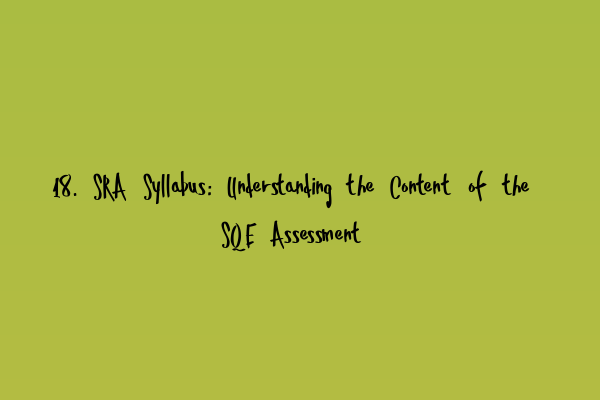The SQE exam, or Solicitors Qualifying Examination, is the new assessment that aspiring solicitors in England and Wales must pass in order to qualify. The exam is designed to be a comprehensive evaluation of the knowledge and skills necessary to practice law effectively.
The SRA syllabus outlines the content that will be tested in the SQE assessment. It is essential for candidates to understand the syllabus and its components in order to properly prepare for the exam. In this article, we will delve into the details of the SRA syllabus and provide guidance on how to approach each section.
1. Foundations of Legal Knowledge
The Foundations of Legal Knowledge section of the SRA syllabus covers six key areas of law:
– Constitutional and Administrative Law
– Criminal Law
– Equity and Trusts
– Contract Law
– Tort Law
– Property Law
It is crucial for candidates to have a comprehensive understanding of these areas as they serve as the building blocks for legal practice. To enhance your understanding of these topics, I recommend utilizing practice exam questions like those found in this SQE 1 Practice Exam Questions article and participating in mock exams such as those available in this SQE 1 Practice Mocks FLK1 FLK2 resource.
2. Legal Research and Writing
Legal research and writing skills are fundamental to a solicitor’s practice. The SRA syllabus recognizes the importance of these skills and includes them as a separate section. Candidates must demonstrate their ability to conduct legal research, analyze legal materials, and communicate their findings effectively.
To excel in this section, it is crucial to develop strong legal research and writing skills. Exploring preparation courses such as those offered in this SQE 2 Preparation Courses resource can provide valuable guidance and practice materials.
3. Dispute Resolution
The dispute resolution section of the SRA syllabus encompasses civil litigation, criminal litigation, and alternative dispute resolution methods. Candidates must demonstrate their knowledge of the legal principles and practical aspects of resolving disputes.
To prepare for this section, candidates should familiarize themselves with relevant procedural rules and case law. It is also beneficial to engage in practical exercises, such as simulated negotiations or mediations, to develop the necessary skills. Practice exam questions and past papers can further strengthen your understanding and test-taking abilities.
4. Property Practice
Property practice is a significant aspect of legal work, and the SRA syllabus includes a section dedicated to this area. Candidates must showcase their understanding of property law, including transfers, leases, mortgages, and other property-related matters.
To prepare effectively for this section, I recommend utilizing resources that offer comprehensive coverage of property law and practice. Enrolling in dedicated SQE 1 preparation courses, such as those available in this SQE 1 Preparation Courses article, can provide you with the necessary knowledge and practice materials.
5. Wills and Administration of Estates
Wills and the administration of estates are integral aspects of private client work. The SRA syllabus includes a section dedicated to these topics to evaluate candidates’ understanding of the legal principles and practical considerations involved.
To excel in this section, candidates should familiarize themselves with the relevant legislation, case law, and procedural requirements. Engaging in practice scenarios and working through sample questions can help develop problem-solving skills and boost confidence in this area.
6. Business Law and Practice
The final section of the SRA syllabus focuses on business law and practice. Candidates must demonstrate their knowledge and understanding of various business entities, commercial contracts, regulatory frameworks, and other related topics.
To prepare for this section, I recommend engaging with practical examples and real-life case studies that illustrate the application of business law principles. Familiarizing yourself with relevant legislation, industry regulations, and legal frameworks is also essential. Additionally, incorporating practice exam questions and mocks into your study routine can help refine your exam techniques and time management skills.
To stay up-to-date with the latest SRA SQE exam dates and crucial information about the exam process, refer to this SRA SQE Exam Dates resource.
In conclusion, understanding the content of the SQE assessment is vital for success. By focusing on the key sections outlined in the SRA syllabus and utilizing various resources, such as practice exam questions, preparation courses, and mock exams, candidates can effectively prepare themselves for the SQE exam and embark on their journey towards becoming qualified solicitors.
Remember to approach your SQE exam preparation with dedication, organization, and a structured study plan. By thoroughly understanding the SRA syllabus and applying your knowledge through practice, you can increase your chances of achieving a favorable outcome in the SQE assessment.
